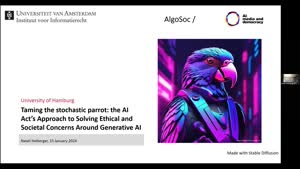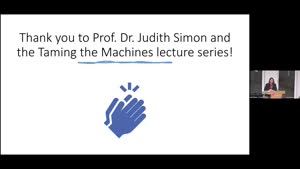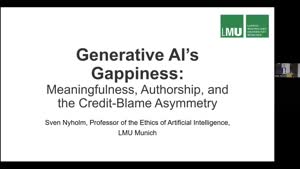Generative AI’s Gappiness: Meaningfulness, Authorship, and the Credit-Blame Asymmetry - Prof. Dr. Sven Nyholm - University of Hamburg
- Lecture2Go
- Catalog
- Sonstige Einrichtungen der UHH
- Öffentliche Vorlesungen
- Taming the Machines - The Philosophy, Ethics and Politics of AI
Catalog
1628 Views
21.11.2023
Generative AI’s Gappiness: Meaningfulness, Authorship, and the Credit-Blame Asymmetry
About the lecture
When generative AI technologies generate novel texts, images, or music in response to prompts from users of these technologies, are the resulting outputs meaningful in all the ways that human-created texts, images, or music can be meaningful? Moreover, who exactly should be considered as the author of these AI outputs? Are texts created by generative AI perhaps best considered as authorless texts? In my presentation, I will relate the above-mentioned questions to the topic of who (if anyone) can take credit for, or potentially be blameworthy for, outputs created with the help of large language models and other generative AI technologies. I will argue that there is an important asymmetry with respect to how easily people can be praiseworthy or blameworthy for outputs they create with the help of generative AI technologies: in general, it is much harder to be praiseworthy for impressive outputs of generative AI than it is to be blameworthy for harmful outputs that we may produce with generative AI. This has implications for the issues of meaning and authorship. Generative AI technologies are in important ways “gappy”: they create gaps with respect to meaning and authorship, as well as with respect to responsibility for their outputs.
About the speaker
Sven Nyholm is Professor of the Ethics of Artificial Intelligence at LMU Munich. He is also a Principal Investigator in the Munich Centre for Machine Learning, a member of the Ethics Advisory Board of the Human Brain Project, and an Associate Editor of the journal Science and Engineering Ethics. His books include This is Technology Ethics: An Introduction, which was published by Wiley-Blackwell in 2023. Nyholm’s research is about how modern technologies – such as artificial intelligence – force society to reconsider and update traditional ethical norms and values as well as our human self-conception.
---
This semesters edition of Taming the Machines explores the interrelated ethical, political, and technological aspects of Artificial Intelligence (AI) in an interdisciplinary way. AI-driven technologies are increasingly shaping the world we live in, sparking growing ethical scrutiny. As a result, it appears more and more urgent that societies collectively address how and in what way the further development of such technologies might be tangibly influenced. And, importantly, by whom this task should be advanced and according to which agendas? Ethicists, legislators, designers, and engineers, each bring distinct expertise and capacities to the multiplicity of social issues raised by these technologies, yet the perspectives and approaches they offer may or may not be complimentary or even simultaneously realisable (let alone mutually satisfactory). Amidst the rising tensions surrounding the AI driven transformation of our shared social space, particularly in the domain of governance and regulation, this lecture series asks how we might best accompany innovation in AI and realise ethically desirable future outcomes. In other words, to delve into the questions of what it means to live well in a society that is increasingly driven by AI tools? What design and regulative choices ought we make? What social infrastructures and normative frameworks might be needed for the future handling of emerging technologies? How could or should openness to innovation be reconciled with defending and developing the ideals of a free and democratic society under the rule of law? To explore these and other related questions, this public lecture series invites distinguished researchers from computer science, philosophy, and political theory to present and discuss their work. To get the latest updates and details how to attend the lectures, please visit http://uhh.de/inf-eit.
---
This semesters edition of Taming the Machines explores the interrelated ethical, political, and technological aspects of Artificial Intelligence (AI) in an interdisciplinary way. AI-driven technologies are increasingly shaping the world we live in, sparking growing ethical scrutiny. As a result, it appears more and more urgent that societies collectively address how and in what way the further development of such technologies might be tangibly influenced. And, importantly, by whom this task should be advanced and according to which agendas? Ethicists, legislators, designers, and engineers, each bring distinct expertise and capacities to the multiplicity of social issues raised by these technologies, yet the perspectives and approaches they offer may or may not be complimentary or even simultaneously realisable (let alone mutually satisfactory). Amidst the rising tensions surrounding the AI driven transformation of our shared social space, particularly in the domain of governance and regulation, this lecture series asks how we might best accompany innovation in AI and realise ethically desirable future outcomes. In other words, to delve into the questions of what it means to live well in a society that is increasingly driven by AI tools? What design and regulative choices ought we make? What social infrastructures and normative frameworks might be needed for the future handling of emerging technologies? How could or should openness to innovation be reconciled with defending and developing the ideals of a free and democratic society under the rule of law? To explore these and other related questions, this public lecture series invites distinguished researchers from computer science, philosophy, and political theory to present and discuss their work. To get the latest updates and details how to attend the lectures, please visit http://uhh.de/inf-eit.
Technical support
Please click on the link bellow and then fill out the required fields to contact our Support Team!
RRZ Support Link




